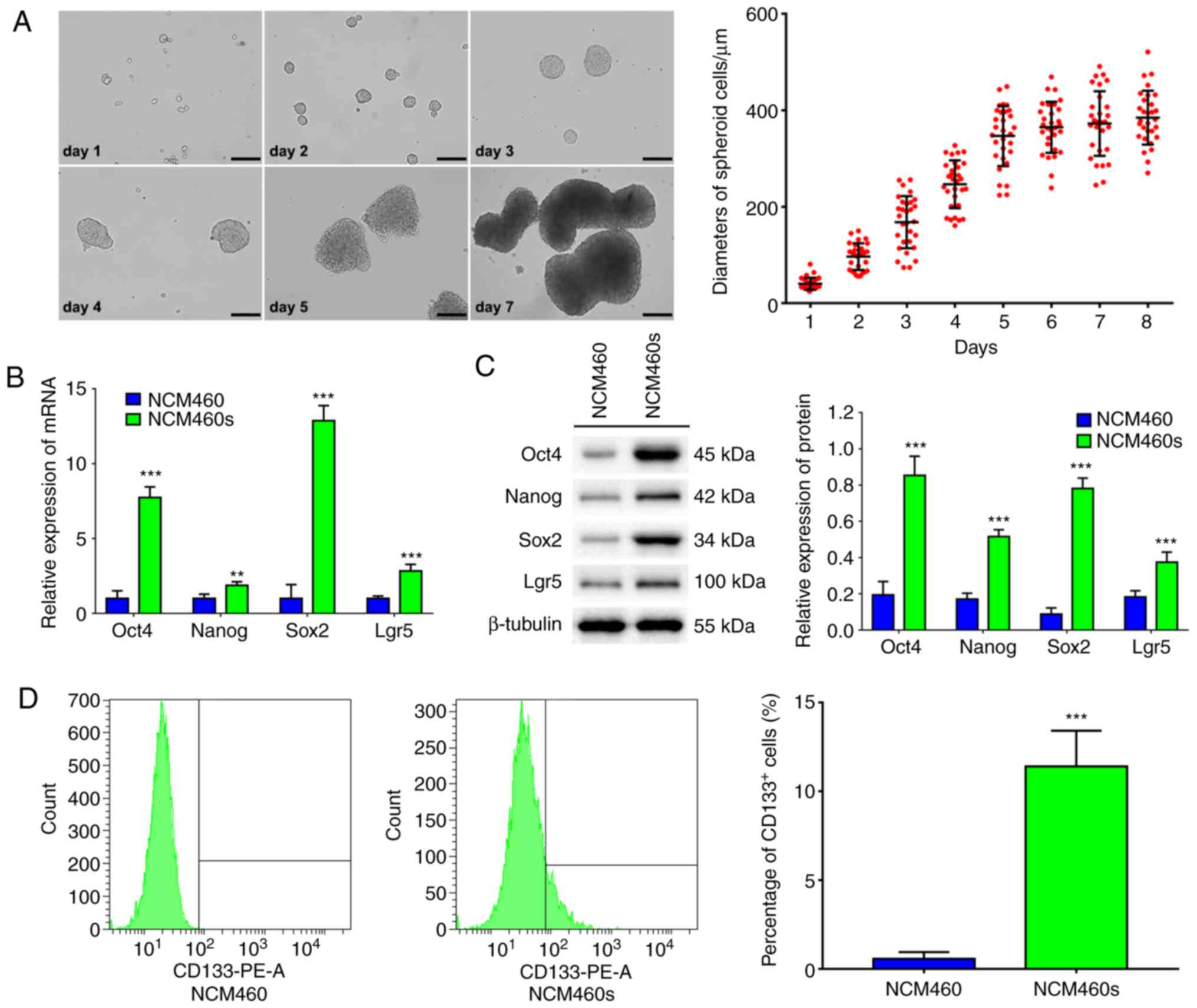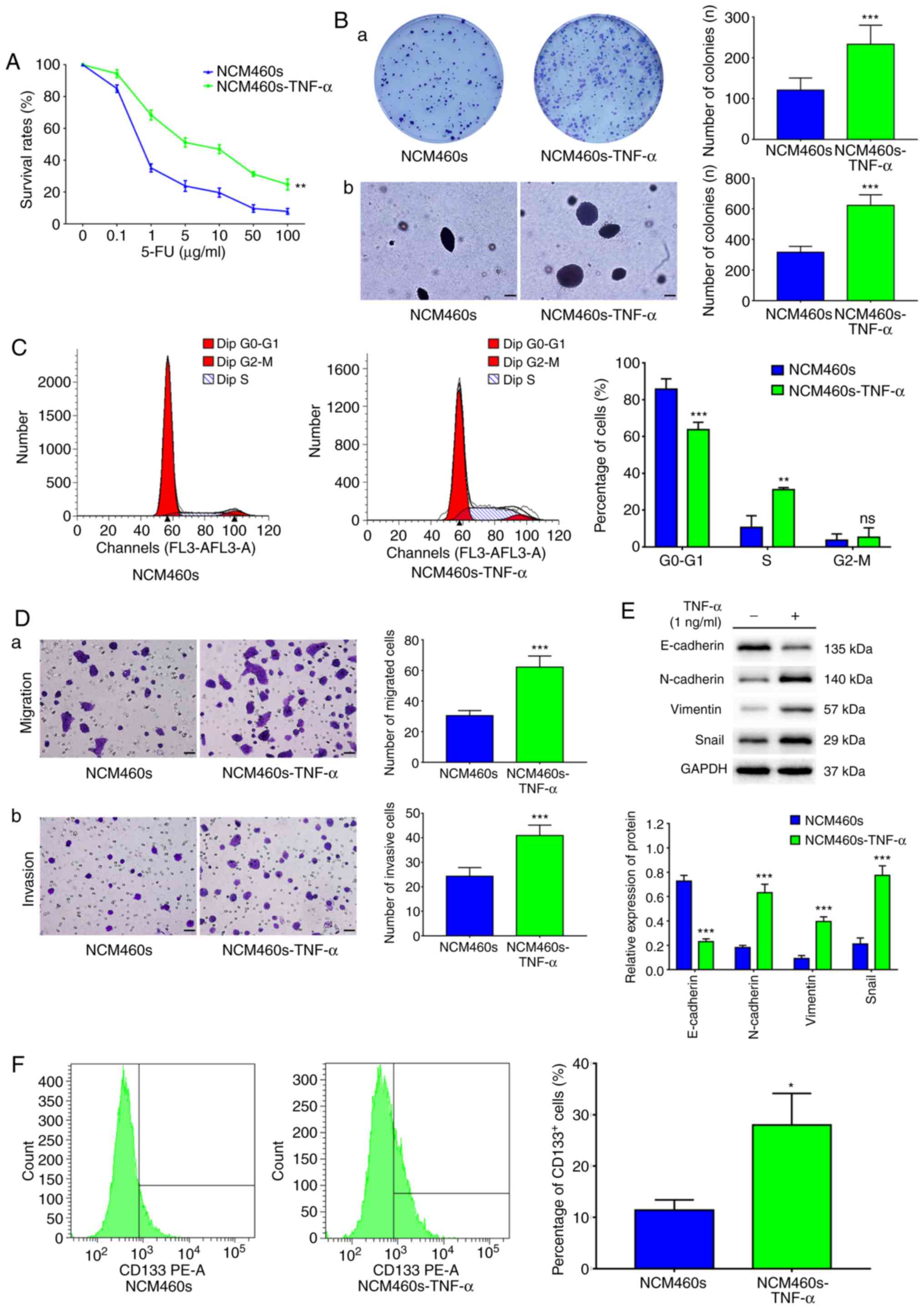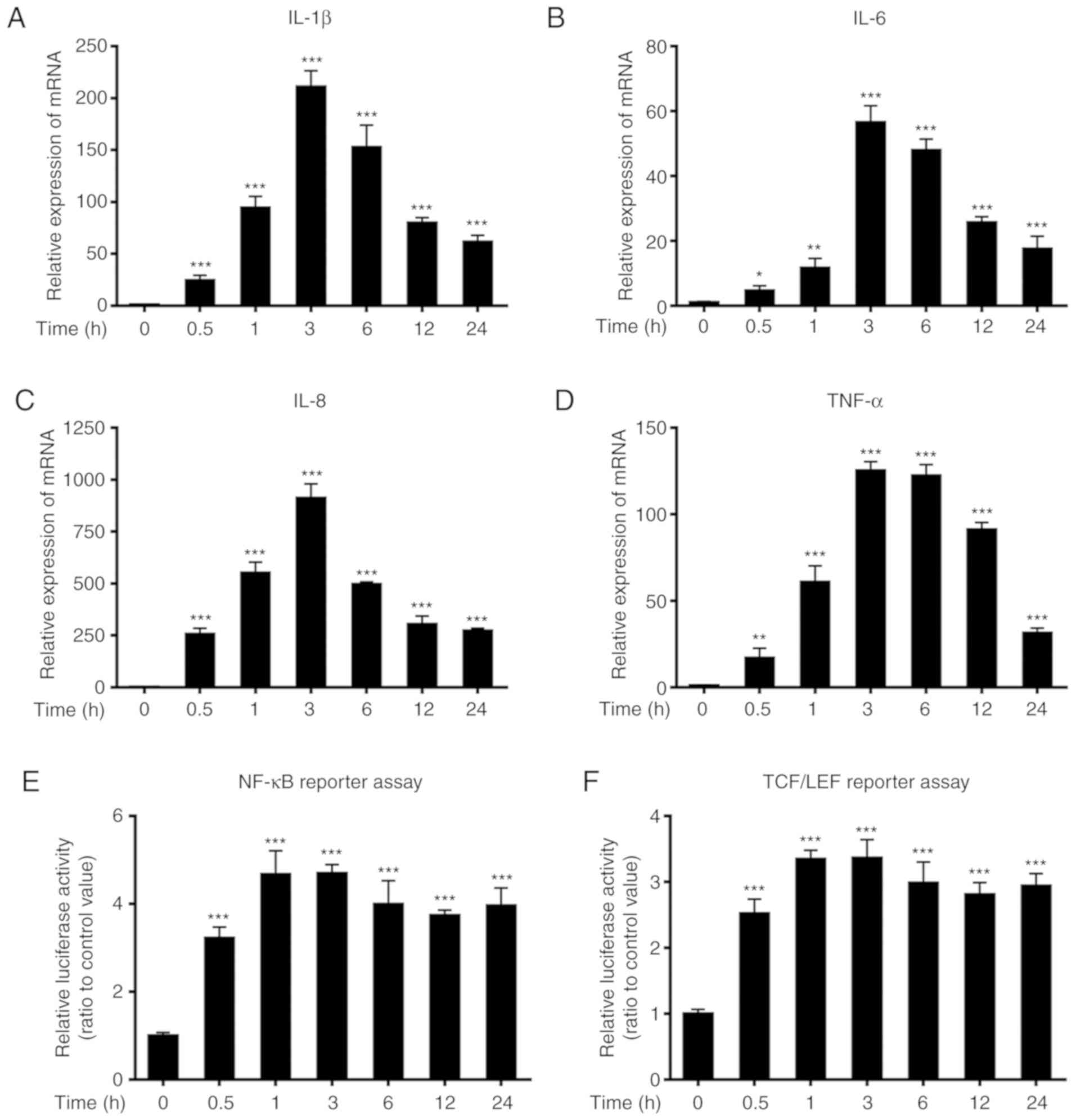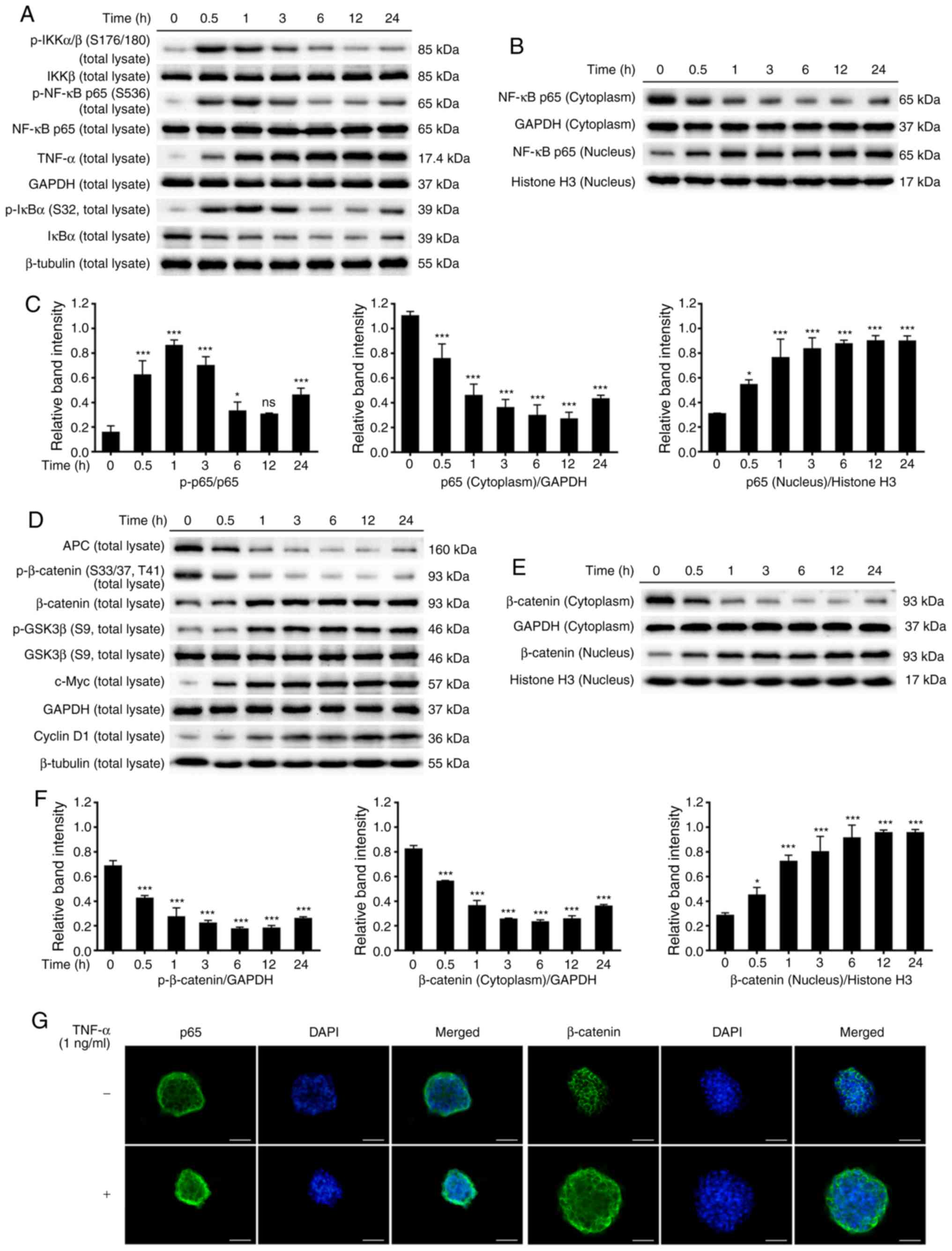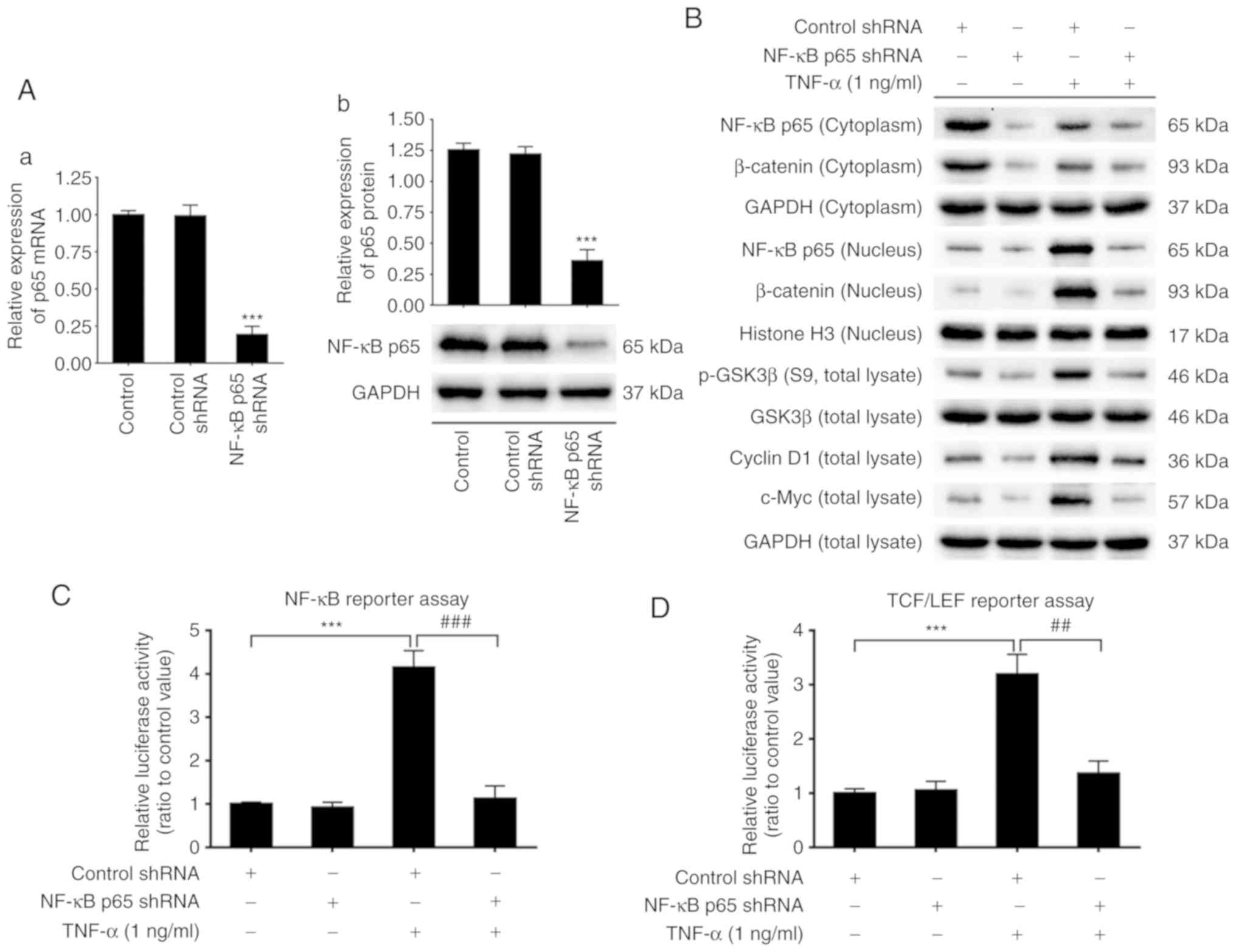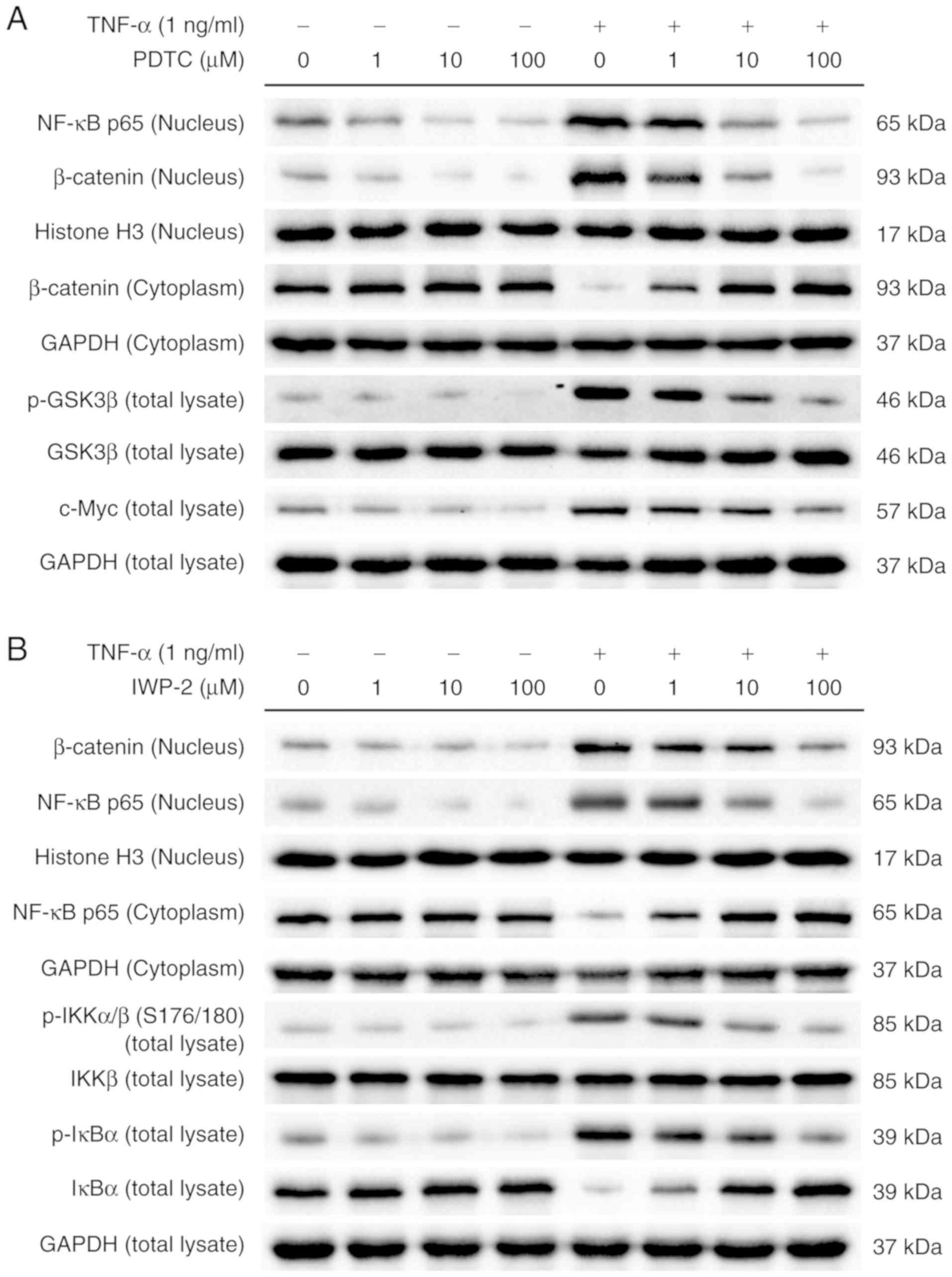|
1
|
Siegel RL, Miller KD and Jemal A: Cancer
statistics, 2019. CA Cancer J Clin. 69:7–34. 2019. View Article : Google Scholar : PubMed/NCBI
|
|
2
|
Chen W, Sun K, Zheng R, Zeng H, Zhang S,
Xia C, Yang Z, Li H, Zou X and He J: Cancer incidence and mortality
in China, 2014. Chin J Cancer Res. 30:1–12. 2018. View Article : Google Scholar : PubMed/NCBI
|
|
3
|
Olejniczak A, Szarynska M and Kmiec Z: In
vitro characterization of spheres derived from colorectal cancer
cell lines. Int J Oncol. 52:599–612. 2018.PubMed/NCBI
|
|
4
|
Zhao H, Yan C, Hu Y, Mu L, Huang K, Li Q,
Li X, Tao D and Qin J: Sphere-forming assay vs. organoid culture:
Determining long-term stemness and the chemoresistant capacity of
primary colorectal cancer cells. Int J Oncol. 54:893–904.
2019.PubMed/NCBI
|
|
5
|
Shah S, Pocard M and Mirshahi M: Targeting
the differentiation of gastric cancer cells (KATOIII) downregulates
epithelial-mesenchymal and cancer stem cell markers. Oncol Rep.
42:670–678. 2019.PubMed/NCBI
|
|
6
|
Zhu R, Gires O, Zhu L, Liu J, Li J, Yang
H, Ju G, Huang J, Ge W, Chen Y, et al: TSPAN8 promotes cancer cell
stemness via activation of sonic Hedgehog signaling. Nat Commun.
10:28632019. View Article : Google Scholar : PubMed/NCBI
|
|
7
|
Celia-Terrassa T, Liu DD, Choudhury A,
Hang X, Wei Y, Zamalloa J, Alfaro-Aco R, Chakrabarti R, Jiang YZ,
Koh BI, et al: Normal and cancerous mammary stem cells evade
interferon-induced constraint through the miR-199a-LCOR axis. Nat
Cell Biol. 19:711–723. 2017. View
Article : Google Scholar : PubMed/NCBI
|
|
8
|
Cable J, Fuchs E, Weissman I, Jasper H,
Glass D, Rando TA, Blau H, Debnath S, Oliva A, Park S, et al: Adult
stem cells and regenerative medicine-a symposium report. Ann N Y
Acad Sci. 1462:27–36. 2019. View Article : Google Scholar : PubMed/NCBI
|
|
9
|
Ji R, Zhang X, Qian H, Gu H, Sun Z, Mao F,
Yan Y, Chen J, Liang Z and Xu W: miR-374 mediates the malignant
transformation of gastric cancer-associated mesenchymal stem cells
in an experimental rat model. Oncol Rep. 38:1473–1481. 2017.
View Article : Google Scholar : PubMed/NCBI
|
|
10
|
Pastrana E, Silva-Vargas V and Doetsch F:
Eyes wide open: A critical review of sphere-formation as an assay
for stem cells. Cell Stem Cell. 8:486–498. 2011. View Article : Google Scholar : PubMed/NCBI
|
|
11
|
Li SC, Lee KL, Luo J, Zhong JF and Loudon
WG: Convergence of normal stem cell and cancer stem cell
developmental stage: Implication for differential therapies. World
J Stem Cells. 3:83–88. 2011. View Article : Google Scholar : PubMed/NCBI
|
|
12
|
Drost J, van Jaarsveld RH, Ponsioen B,
Zimberlin C, van Boxtel R, Buijs A, Sachs N, Overmeer RM, Offerhaus
GJ, Begthel H, et al: Sequential cancer mutations in cultured human
intestinal stem cells. Nature. 521:43–47. 2015. View Article : Google Scholar : PubMed/NCBI
|
|
13
|
Barker N, Ridgway RA, van Es JH, van de
Wetering M, Begthel H, van den Born M, Danenberg E, Clarke AR,
Sansom OJ and Clevers H: Crypt stem cells as the cells-of-origin of
intestinal cancer. Nature. 457:608–611. 2009. View Article : Google Scholar : PubMed/NCBI
|
|
14
|
Shigdar S, Li Y, Bhattacharya S, O'Connor
M, Pu C, Lin J, Wang T, Xiang D, Kong L, Wei MQ, et al:
Inflammation and cancer stem cells. Cancer Lett. 345:271–278. 2014.
View Article : Google Scholar : PubMed/NCBI
|
|
15
|
Tang F, Wang Y, Hemmings BA, Rüegg C and
Xue G: PKB/Akt-dependent regulation of inflammation in cancer.
Semin Cancer Biol. 48:62–69. 2018. View Article : Google Scholar : PubMed/NCBI
|
|
16
|
Taniguchi K and Karin M: NF-κB,
inflammation, immunity and cancer: Coming of age. Nat Rev Immunol.
18:309–324. 2018. View Article : Google Scholar : PubMed/NCBI
|
|
17
|
Zanotto-Filho A, Rajamanickam S, Loranc E,
Masamsetti VP, Gorthi A, Romero JC, Tonapi S, Goncalves RM, Reddick
RL, Benavides R, et al: Sorafenib improves alkylating therapy by
blocking induced inflammation, invasion and angiogenesis in breast
cancer cells. Cancer Lett. 425:101–115. 2018. View Article : Google Scholar : PubMed/NCBI
|
|
18
|
Bloemendaal AL, Buchs NC, George BD and
Guy RJ: Intestinal stem cells and intestinal homeostasis in health
and in inflammation: A review. Surgery. 159:1237–1248. 2016.
View Article : Google Scholar : PubMed/NCBI
|
|
19
|
Ma B and Hottiger MO: Crosstalk between
Wnt/β-catenin and NF-κB signaling pathway during inflammation.
Front Immunol. 7:3782016. View Article : Google Scholar : PubMed/NCBI
|
|
20
|
Kakiuchi N, Yoshida K, Uchino M, Kihara T,
Akaki K, Inoue Y, Kawada K, Nagayama S, Yokoyama A, Yamamoto S, et
al: Frequent mutations that converge on the NFKBIZ pathway in
ulcerative colitis. Nature. 577:1–6. 2020. View Article : Google Scholar
|
|
21
|
Kong FF, Li D, Yang H, Ma J, Pan X, Liu
HX, Huo JN and Ma XX: Preliminary identification of endometrial
cancer stem cells in vitro and in vivo. Biochem Biophys Res Commun.
490:506–513. 2017. View Article : Google Scholar : PubMed/NCBI
|
|
22
|
Zhai Y, Wei R, Sha S, Lin C, Wang H, Jiang
X and Liu G: Effect of NELL1 on lung cancer stemlike cell
differentiation. Oncol Rep. 41:1817–1826. 2019.PubMed/NCBI
|
|
23
|
Livak KJ and Schmittgen TD: Analysis of
relative gene expression data using real-time quantitative PCR and
the 2(-Delta Delta C(T)) method. Methods. 25:402–408. 2001.
View Article : Google Scholar : PubMed/NCBI
|
|
24
|
Lee JH, Yun CW, Han YS, Kim S, Jeong D,
Kwon HY, Kim H, Baek MJ and Lee SH: Melatonin and 5-fluorouracil
co-suppress colon cancer stem cells by regulating cellular prion
protein-Oct4 axis. J Pineal Res. 65:e125192018. View Article : Google Scholar : PubMed/NCBI
|
|
25
|
Grivennikov SI, Greten FR and Karin M:
Immunity, inflammation, and cancer. Cell. 140:883–899. 2010.
View Article : Google Scholar : PubMed/NCBI
|
|
26
|
Barker N, van Es JH, Kuipers J, Kujala P,
van den Born M, Cozijnsen M, Haegebarth A, Korving J, Begthel H,
Peters PJ, et al: Identification of stem cells in small intestine
and colon by marker gene Lgr5. Nature. 449:1003–1007. 2007.
View Article : Google Scholar : PubMed/NCBI
|
|
27
|
Leung C, Tan SH and Barker N: Recent
advances in Lgr5(+) stem cell research. Trends Cell Biol.
28:380–391. 2018. View Article : Google Scholar : PubMed/NCBI
|
|
28
|
Arab-Bafrani Z, Shahbazi-Gahrouei D,
Abbasian M, Saberi A, Fesharaki M, Hejazi SH and Manshaee S:
Culturing in serum-free culture medium on collagen type-I-coated
plate increases expression of CD133 and retains original phenotype
of HT-29 cancer stem cell. Adv Biomed Res. 5:592016. View Article : Google Scholar : PubMed/NCBI
|
|
29
|
Leng Z, Tao K, Xia Q, Tan J, Yue Z, Chen
J, Xi H, Li J and Zheng H: Kruppel-like factor 4 acts as an
oncogene in colon cancer stem cell-enriched spheroid cells. PLoS
One. 8:e560822013. View Article : Google Scholar : PubMed/NCBI
|
|
30
|
Hu F, Li C, Zheng X, Zhang H, Shen Y, Zhou
L, Yang X, Han B and Zhang X: Lung adenocarcinoma resistance to
therapy with EGFR-tyrosine kinase inhibitors is related to
increased expression of cancer stem cell markers SOX2, OCT4 and
NANOG. Oncol Rep. 43:727–735. 2020.PubMed/NCBI
|
|
31
|
Chen X, Liu R, Liu X, Xu C and Wang X:
Protective role of Coxsackie-adenovirus receptor in the
pathogenesis of inflammatory bowel diseases. Biomed Res Int.
2018:72072682018.PubMed/NCBI
|
|
32
|
Balkwill F: Tumour necrosis factor and
cancer. Nat Rev Cancer. 9:361–371. 2009. View Article : Google Scholar : PubMed/NCBI
|
|
33
|
Kretzschmar K and Clevers H: Wnt/β-catenin
signaling in adult mammalian epithelial stem cells. Dev Biol.
428:273–282. 2017. View Article : Google Scholar : PubMed/NCBI
|
|
34
|
Jang J, Jung Y, Chae S, Chung SI, Kim SM
and Yoon Y: WNT/β-catenin pathway modulates the TNF-α-induced
inflammatory response in bronchial epithelial cells. Biochem
Biophys Res Commun. 484:442–449. 2017. View Article : Google Scholar : PubMed/NCBI
|
|
35
|
Schwitalla S, Fingerle AA, Cammareri P,
Nebelsiek T, Goktuna SI, Ziegler PK, Canli O, Heijmans J, Huels DJ,
Moreaux G, et al: Intestinal tumorigenesis initiated by
dedifferentiation and acquisition of stem-cell-like properties.
Cell. 152:25–38. 2013. View Article : Google Scholar : PubMed/NCBI
|
|
36
|
Teo JL and Kahn M: The Wnt signaling
pathway in cellular proliferation and differentiation: A tale of
two coactivators. Adv Drug Deliv Rev. 62:1149–1155. 2010.
View Article : Google Scholar : PubMed/NCBI
|
|
37
|
Ledoux AC and Perkins ND: NF-κB and the
cell cycle. Biochem Soc Trans. 42:76–81. 2014. View Article : Google Scholar : PubMed/NCBI
|
|
38
|
Liu X, Chen H, Hou Y, Ma X, Ye M, Huang R,
Hu B, Cao H, Xu L, Liu M, et al: Adaptive EGF expression sensitizes
pancreatic cancer cells to ionizing radiation through activation of
the cyclin D1/P53/PARP pathway. Int J Oncol. 54:1466–1480.
2019.PubMed/NCBI
|















